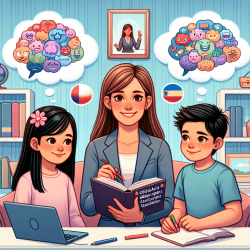Introduction
In the realm of speech-language pathology, understanding the cultural context of our clients can significantly enhance therapeutic outcomes. The research article "Implications of a Culturally Evolved Self for Notions of Free Will" by Lloyd Hawkeye Robertson offers profound insights into how cultural evolution and the concept of free will can be integrated into therapeutic practices. This blog explores how these insights can be applied to improve outcomes for children receiving speech-language therapy.
The Cultural Self and Free Will
Robertson's research highlights the evolution of the self as a cultural construct, emphasizing that the notion of free will is deeply intertwined with cultural evolution. This evolved self, characterized by personal volition, continuity, and reason, forms the foundation of what it means to be human. For speech-language pathologists, understanding these cultural dimensions can provide a more comprehensive approach to therapy.
Applying Cultural Insights in Therapy
Integrating cultural insights into therapy involves recognizing the cultural backgrounds and individual volition of each child. Here are some practical steps to incorporate these insights:
- Individualized Assessment: Conduct assessments that consider the child's cultural background and family dynamics. This helps in understanding the child's communication style and potential barriers.
- Cultural Sensitivity: Be aware of cultural norms and values that may influence a child's communication patterns. Tailor your therapy approach to respect and incorporate these cultural elements.
- Empowering Choices: Encourage children to make choices during therapy sessions. This fosters a sense of agency and reinforces the concept of free will, contributing to their confidence and engagement.
Encouraging Further Research
While the integration of cultural insights into therapy is promising, there is a need for further research to explore the impact of these practices on therapy outcomes. Practitioners are encouraged to engage in research that examines the effectiveness of culturally-informed therapy approaches and share their findings with the broader community.
Conclusion
By embracing the insights from cultural evolution and free will, speech-language pathologists can enhance their therapeutic practices, leading to more effective and personalized care for children. This approach not only respects the individuality of each child but also empowers them to achieve their full potential.
To read the original research paper, please follow this link: Implications of a Culturally Evolved Self for Notions of Free Will.










